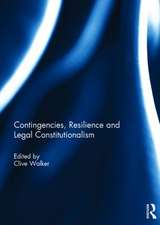The EU as a 'Global Player' in Human Rights?: Routledge Research in Human Rights Law
Editat de Jan Wetzelen Limba Engleză Hardback – 16 feb 2012
In total, The EU as a 'Global Player' in Human Rights gives an overview of the international relevance of EU human rights law by means of exemplary case-studies of the EU’s institutional and substantive protection of human rights, whilst consideration of non-European perspectives from China and Japan underline its global focus. This book will be of particular interest to researchers, students, and practitioners in International and European law, Human Rights Law, European studies and International Relations.
Din seria Routledge Research in Human Rights Law
-
 Preț: 327.55 lei
Preț: 327.55 lei -
 Preț: 309.90 lei
Preț: 309.90 lei -
 Preț: 328.25 lei
Preț: 328.25 lei -
 Preț: 386.21 lei
Preț: 386.21 lei - 8%
 Preț: 388.56 lei
Preț: 388.56 lei -
 Preț: 312.02 lei
Preț: 312.02 lei - 20%
 Preț: 268.89 lei
Preț: 268.89 lei -
 Preț: 311.18 lei
Preț: 311.18 lei -
 Preț: 384.91 lei
Preț: 384.91 lei -
 Preț: 327.10 lei
Preț: 327.10 lei -
 Preț: 326.49 lei
Preț: 326.49 lei - 9%
 Preț: 936.56 lei
Preț: 936.56 lei -
 Preț: 318.31 lei
Preț: 318.31 lei -
 Preț: 341.55 lei
Preț: 341.55 lei - 18%
 Preț: 1167.58 lei
Preț: 1167.58 lei - 18%
 Preț: 1058.38 lei
Preț: 1058.38 lei - 18%
 Preț: 1058.65 lei
Preț: 1058.65 lei - 18%
 Preț: 1056.28 lei
Preț: 1056.28 lei - 26%
 Preț: 822.34 lei
Preț: 822.34 lei - 18%
 Preț: 1168.40 lei
Preț: 1168.40 lei - 25%
 Preț: 823.63 lei
Preț: 823.63 lei -
 Preț: 371.64 lei
Preț: 371.64 lei -
 Preț: 473.88 lei
Preț: 473.88 lei - 18%
 Preț: 1110.92 lei
Preț: 1110.92 lei - 26%
 Preț: 847.31 lei
Preț: 847.31 lei -
 Preț: 369.73 lei
Preț: 369.73 lei -
 Preț: 464.16 lei
Preț: 464.16 lei - 18%
 Preț: 1169.97 lei
Preț: 1169.97 lei - 25%
 Preț: 824.17 lei
Preț: 824.17 lei - 18%
 Preț: 1117.88 lei
Preț: 1117.88 lei - 18%
 Preț: 1057.57 lei
Preț: 1057.57 lei - 18%
 Preț: 1061.06 lei
Preț: 1061.06 lei - 18%
 Preț: 1111.58 lei
Preț: 1111.58 lei - 18%
 Preț: 1057.75 lei
Preț: 1057.75 lei - 18%
 Preț: 1109.18 lei
Preț: 1109.18 lei -
 Preț: 475.16 lei
Preț: 475.16 lei - 18%
 Preț: 1059.48 lei
Preț: 1059.48 lei - 18%
 Preț: 1060.52 lei
Preț: 1060.52 lei -
 Preț: 414.32 lei
Preț: 414.32 lei - 18%
 Preț: 1053.92 lei
Preț: 1053.92 lei -
 Preț: 423.30 lei
Preț: 423.30 lei
Preț: 1061.57 lei
Preț vechi: 1294.60 lei
-18% Nou
Puncte Express: 1592
Preț estimativ în valută:
203.14€ • 212.80$ • 168.35£
203.14€ • 212.80$ • 168.35£
Carte tipărită la comandă
Livrare economică 08-22 aprilie
Preluare comenzi: 021 569.72.76
Specificații
ISBN-13: 9780415587051
ISBN-10: 0415587050
Pagini: 264
Dimensiuni: 156 x 234 x 16 mm
Greutate: 0.65 kg
Ediția:1
Editura: Taylor & Francis
Colecția Routledge
Seria Routledge Research in Human Rights Law
Locul publicării:Oxford, United Kingdom
ISBN-10: 0415587050
Pagini: 264
Dimensiuni: 156 x 234 x 16 mm
Greutate: 0.65 kg
Ediția:1
Editura: Taylor & Francis
Colecția Routledge
Seria Routledge Research in Human Rights Law
Locul publicării:Oxford, United Kingdom
Public țintă
Postgraduate and UndergraduateCuprins
1. Introduction, Jan Erik Wetzel Part 1: The Position of Human Rights Within the EU Framework 2. Assessing the EU's Position on Human Rights: Is it a Desireable One?, Richard Burchill 3. Monitoring and Enforcing Fundamental Rights: Can the European Union Measure Up Against Other Intrnational Organisations?, Rhona K.M. Smith 4. European Human Rights Law as a Multi-Layered Human Rights Regime: Preserving Diversity and Promoting Human Rights, Marton Varju Part 2: EU Human Rights Policies in Internationl Institutions 5. Inconvenient Multilateralism: The Challenges of the EU as a Player in the United Nations Human Rights Council, Gjovalin Macaj and Joachim A. Koops 6. The EU Commitment to International Criminal Justice: Achievements and Possibilities, Olympia Bekou and Marck Chadwick 7. Human Rights in Trade: The EU's Experience with Labour Standards Conditionality and its Role in Promoting Labour Standards in the WTO, Tamara Takacs Part 3: The Influence of EU Human Rights Law Outside of Europe 8. Imperialistic Endeavour or Empty Rhetoric? Analysing the EU's Promotion of Human Rights in China Since 1989 through a 'Normative Power' Perspective, Wenwen Shen 9. Too Different to be Relevant? Considering the Global Influence of EU Asylum Laws and Policy wit Respect to Japan, Emiko Nakasaka 10. The Promotion and Protection of Human Rights during Common Security and Defence Policy Operations: In-Between a Spreading State of Mind and an Unsolved Concern, Maria Luisia Sanchez Barrueco Part 4: EU Human Rights Law as a Regional International Standard 11. The EU Competition Policy as an International Human Rights Issue, Wolfgang Weiß 12. Double Jeopardy in Europe: What Lessons for Global Players?, Dawn Sedman 13. Defining the Free Press: Recent European Case-Law on Political Free Speech, Anti-Terrorism Legislation and the Free Press, Angus Nurse 14. EU Equality Law: From Protecting 'Groups' to Protection of All, Joanne Milner 15. Conclusion, Looking to the Future: No Hubris, No False Modesty, Geoffrey Harris
Recenzii
... the whole book remains cohesive and tries to address the question mainly from a legal perspective. The book would be of particular relevance to undergraduates and postgraduates of EU studies, law, and human rights as well as researchers and human rights activists who wish to assess the extent to which the EU is a global player in the field of human rights. - Mika Obara for Human rights Review (2013) 14:429–430
Descriere
Following on from the 2008 Kadi-decision by the European Court of Justice, which has been widely discussed as possibly creating a conflict between the UN and the EU, this book explores whether the EU's human rights order has real and distinctive relevance on a global scale and whether it can be considered as a significant international human rights organisation. The contributions to this volume are clustered around four themes: the EU human rights policies in international institutions; the influence of EU human rights law outside of Europe; whether the EU human rights order has set new substantive rules which are different from other international/regional standards; and the relationship between human rights and economic goals in the EU.

















